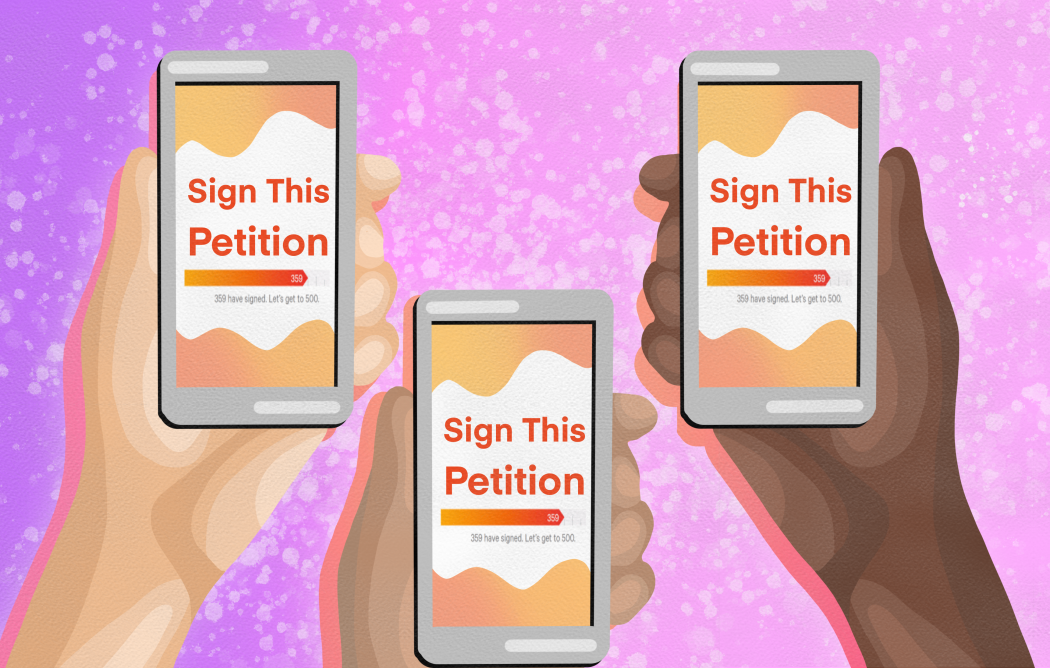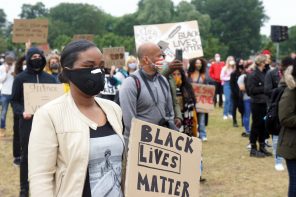As part of the 2020 Fall print edition series “Going the Distance,” News Writer Carlie Balcom investigated the presence of virtual activism throughout the unprecedented year. This piece is part of a larger canon of student works reflecting on the social impacts of COVID-19 during the Fall 2020 semester.
“I wasn’t able to attend any protests because of COVID, but I still wanted to show my support as an ally which social media allowed me to do” shares Wiley McGowan, U1.
This summer, the Black Lives Matter movement, sparked by the murder of George Floyd was a catalyst for change, causing a massreckoning with omnipresent realities of systemic racism and police brutality. In addition to in-person protests, social media played an important role in supporting the Black Lives Matter movement.
Due to the current pandemic, health guidelines restricted many people from showing support through in-person protesting. In response to these restrictions, social media activism blew up as an alternative way to support the movement. One example of this was #BlackoutTuesday. On June 2, the music industry launched a campaign, which asked Instagram users posting black squares on their account as an act of solidarity, calling attention to the ongoing police brutality. Over 28-million black squares were posted.
Following the wave of black squares came posts about how this campaign was drowning out important information regarding safety at the in-person protests. According to a CNN article, “several activists and influencers have pointed out that posting a blank black image with a bunch of tags clogs up critical channels of information and updates.” Even though the posts were with good intentions, it ended up doing more harm than good. This led instagram users to think more critically about what they were posting on their account and why.
“I didn’t know whether or not I should post. I wanted to show support but also be effective about what I was posting” shares McGowan. Students shared that there was significant social pressure compelling many to post, as silence could be interpreted as ignorant, or even racist.
Susan Zhang, U1, shares how she was called out by a friend for not posting for the Black Lives Matter movement, “I was told because I didn’t post that I didn’t care”, she shared. “After that, I totally felt pressured to post. I felt like if I didn’t people would think I was racist”, Zhang added.
Molly, who wishes to remain anonymous, also shares that in the height of the Black Lives Matter movement she too felt social pressure to post. “At first I was annoyed at those who didn’t post because I thought that meant they weren’t an ally. Later on, I realized everyone uses social media differently. Just because someone didn’t post doesn’t mean they don’t support the movement,” shares Molly, a U1 Arts student.
Activism is not restricted to social media. “I’d rather have someone have a meaningful conversation about it and learn something from that than to post an Instagram story about it,” says McGowan.
Dr Jonathan Sterne, a Communications Studies professor, looks at successes of social movements in the past quarter century and emphasizes the need for institutions and organizations. Past movements “all did a lot of on-the-ground organizing: talking with people, sometimes one by one.” Social media is only a part of it, Sterne points out.
Sterne credits the success of the BLM movement to both online and offline organizations of many different interconnected people. He adds “the only reason [the movement] is sustained is because of those organizations that exist beyond platforms like Twitter.”
The Black Students’ Network of McGill shared a statement, noting that activism goes far beyond an Instagram story. This statement via Facebook reads “though we appreciate the support that has been given to marginalized communities in this time, we would also like to point out that performative actions do very little to actually help.” The post stresses the importance of putting words into actions. “This is not a moment, but a movement we have the privilege to be a part of, don’t let your part in it begin and end with a statement.”
The movement brought attention to the effectiveness of social media activism. “It’s nice to see people posting stuff on the internet to spread awareness of important issues and to educate themselves,” says Max Garcia, U2. However, Garcia believes it becomes an issue “when they don’t follow through with it in person or stop because it isn’t trendy anymore. Just practice what you preach” Garcia adds.
“There’s a problem with posting for the sake of posting without having an understanding of what message you’re sending,” McGowan states.
When posting on social media, Zhang noted the importance of sharing reliable sources. “A lot of information on social media isn’t true. A background check is a priority before posting something.”
Now more than ever in the pandemic, people are spending a lot of time on their phones and social media specifically. “Honestly I do think [social media] is effective. I know a lot of people say otherwise, but it’s so accessible to everyone. I know a lot of people who wouldn’t be as woke as they are now without social media activism” shares Garcia. McGowan attributes this attitude in part to the pandemic as “people are more vulnerable right now so perhaps that makes them more empathetic towards issues going on in the world.”
Professor Sterne shared his thoughts on how social media is a powerful tool and is an effective way to spread information. “[The BLM movement] made very effective use of Twitter to publicize extrajudicial killings by U.S. police, to the point where the movement against police has become quite internationalized in part because activists in one country can use tools and rhetorics developed by activists in another.”
While for activism to be effective in the long-term it must go far beyond social media posts, as Zhang states “it’s definitely raising awareness and that’s a good thing about it.”




